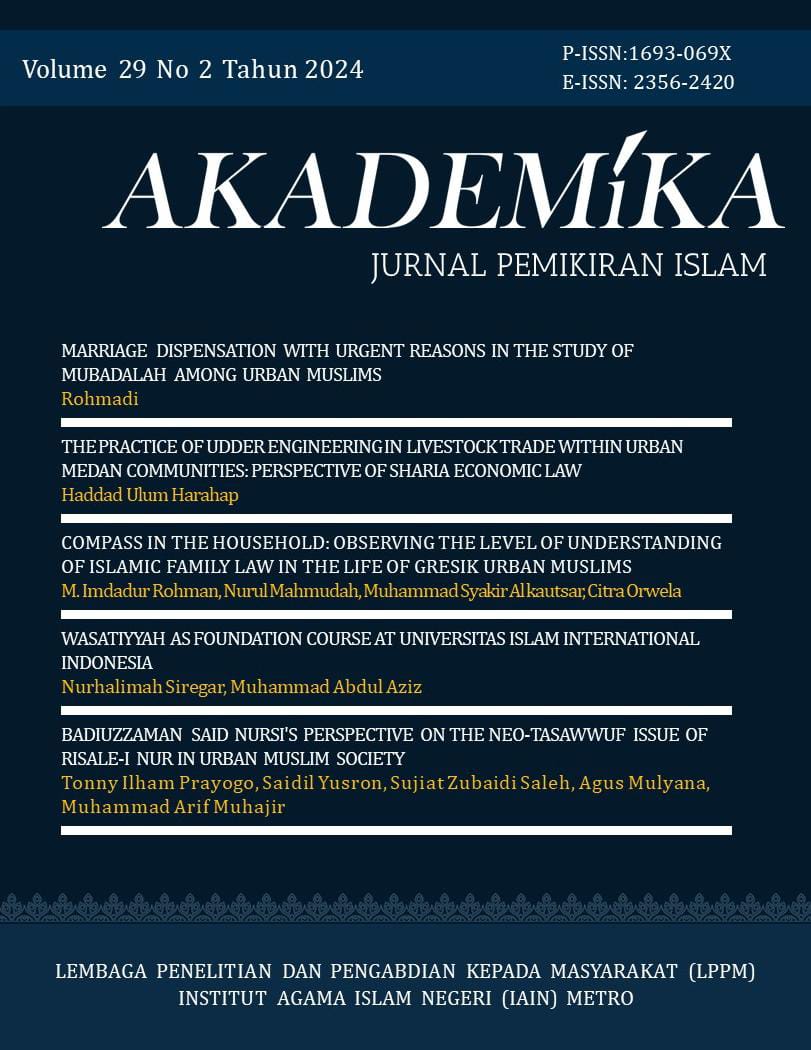THE IMPACT OF STRESS MANAGEMENT FOR URBAN MUSLIMS: INCREASING THE RESILIENCE OF SURVIVORS OF THE KANJURUHAN TRAGEDY
DOI:
https://doi.org/10.32332/akademika.v29i2.9762Keywords:
Resilience; Stress management; Tragedy survivors.Abstract
One of the impacts of a disaster or tragedy is the presence of trauma after the event or a mental state that is shaken so that it is unable to survive with a healthy mentality. This research aims to help Muslim urban communities who are victims of the Kanjuruhan tragedy through the provision of the Impact of stress management to increase resilience. In this study, the researcher used a quantitative approach with the quasi-experimental method of one group pretest post-test to test the effect of treatment before and after treatment. The participants were 19 (3 victims were directly affected, and 16 were indirectly affected). Data were collected through questionnaires before and after the administration of treatment, as well as long-term monitoring. The results showed a significant difference in participants’ resilience levels before and after being given the Impact of stress management. The effect size caused by these activities is relatively large when viewed from the average resilience ratio before and after activities. Likewise, the significance test that shows a significant impact is shown by a significance number of 0.000, which is < out of 0.05. This study concludes that the Impact of stress management is practical and has a significant effect on increasing the resilience of the participant.
Downloads
References
Darmayanti, N., & Daulay, N. (2020). Pengaruh Pelatihan Manajemen Stres terhadap Kebahagiaan Santri di Pesantren. Gadjah Mada Journal of Professional Psychology (GamaJPP), 6(2), Article 2. https://doi.org/10.22146/gamajpp.55682.
Deviantony, F. (2020). The Phenomenology Study: Post-Flood and Landslide Farmers Resilience Experiences In Village. Jurnal Ilmiah Kesehatan Media Husada, 9(2), Article 2. https://doi.org/10.33475/jikmh.v9i2.222.
Dick, A. S., Silva, K., Gonzalez, R., Sutherland, M. T., Laird, A. R., Thompson, W. K., Tapert, S. F., Squeglia, L. M., Gray, K. M., Nixon, S. J., Cottler, L. B., La Greca, A. M., Gurwitch, R. H., & Comer, J. S. (2021). Neural vulnerability and hurricane-related media are associated with post-traumatic stress in youth. Nature Human Behaviour, 5(11), 1578–1589. https://doi.org/10.1038/s41562-021-01216-3.
Habibi, M., Handoko, D., Kurniawan, D., Rasman, R., & Anggriani, R. (2023). Tragedi Kerusuhan Stadion Kanjuruhan Dalam Bingkai Media Asing. Perspektif Komunikasi: Jurnal Ilmu Komunikasi Politik Dan Komunikasi Bisnis, 7(1), Article 1. https://doi.org/10.24853/pk.7.1.43-64.
Hasanah, C. D. U., & Ambarini, T. K. (2018). Hubungan Faktor Trauma Masa Lalu dengan Status Mental Beresiko Gangguan Psikosis Pada Remaja Akhir di DKI Jakarta. INSAN Jurnal Psikologi Dan Kesehatan Mental, 3(2), Article 2. https://doi.org/10.20473/jpkm.V3I22018.73-81.
Kurnia, Duku, S., & Yahya, A. H. (2023). Konstruksi Pemberitaan Tragedi Kanjuruhan (Analisis Framing Di Detik.Com). Jurnal Ilmu Sosial, Humaniora Dan Seni, 1(2), Article 2. https://doi.org/10.47233/jishs.v1i2.647.
Luthans, F., Avolio, B. J., Avey, J. B., & Norman, S. M. (2007). Positive psychological capital: Measurement and relationship with performance and satisfaction. Personnel Psychology, 60(3), 541–572. https://doi.org/10.1111/j.1744-6570.2007.00083.x.
Makwana, N. (2019). Disaster and its impact on mental health: A narrative review. Journal of Family Medicine and Primary Care, 8(10), 3090–3095. https://doi.org/10.4103/jfmpc.jfmpc_893_19.
Muliani, N. (2019). Trauma Healing Bencana Perspsektif Islam dan Barat (Sufi Healing dan Konseling Traumatik). Jurnal Al-Irsyad: Jurnal Bimbingan Konseling Islam, 1(2), Article 2. https://doi.org/10.24952/bki.v1i2.1968.
Nixon, P., Ebert, D. D., Boß, L., Angerer, P., Dragano, N., & Lehr, D. (2022). The Efficacy of a Web-Based Stress Management Intervention for Employees Experiencing Adverse Working Conditions and Occupational Self-efficacy as a Mediator: Randomized Controlled Trial. Journal of Medical Internet Research, 24(10), e40488. https://doi.org/10.2196/40488.
Raissifar, K., & Akhavan Anvari, M. R. (2020). Psychological Capital: The Role of Attachment (Case Study: Tehran Children’s Hospital). Interdisciplinary Journal of Management Studies (Formerly Known as Iranian Journal of Management Studies), 13(1), 95–115. https://doi.org/10.22059/ijms.2019.111414.671561.
Razy, M. F., Sugandi, Y. S., & Fedriansyah, M. (2022). Resiliensi Masyarakat Penyintas Bencana Alam pada Masa Pandemi Covid-19 di Kota Palu Sulawesi Tengah. Jurnal Sosiologi Andalas, 8(2), Article 2. https://doi.org/10.25077/jsa.8.2.176-191.2022.
Rosenberg, A. R., Yi-Frazier, J. P., Eaton, L., Wharton, C., Cochrane, K., Pihoker, C., Baker, K. S., & McCauley, E. (2015). Promoting Resilience in Stress Management: A Pilot Study of a Novel Resilience-Promoting Intervention for Adolescents and Young Adults With Serious Illness. Journal of Pediatric Psychology, 40(9), 992–999. https://doi.org/10.1093/jpepsy/jsv004.
Safarina, N. A., & Suzanna, E. (2021). Gambaran Resiliensi Masyarakat Aceh Setelah Mengalami Pengalaman Traumatis. Jurnal Psikologi Terapan (JPT), 3(1), Article 1. https://doi.org/10.29103/jpt.v3i1.3639.
Saputra, A., Diponegoro, A. M., & Urbayatun, S. (2023). Resiliensi Pada Penyintas Pasca Gempa Bumi Lombok. Psyche: Jurnal Psikologi, 5(2), 203–233. https://doi.org/10.36269/psyche.v5i2.1362.
Southwick, S. M., Bonanno, G. A., Masten, A. S., Panter-Brick, C., & Yehuda, R. (2014). Resilience definitions, theory, and challenges: Interdisciplinary perspectives. European Journal of Psychotraumatology, 5(1), 25338. https://doi.org/10.3402/ejpt.v5.25338.
Tarigan, A. H. Z., Appulembang, Y. A., & Nugroho, I. P. (2021). Pengaruh Stress Management Terhadap Resiliensi Mahasiswa Semester Akhir di Palembang. Jurnal Bimbingan dan Konseling ar-Rahman, 7(1), Article 1. https://doi.org/10.31602/jbkr.v7i1.4989.
Utami, S. S., Erawati, M., & Dewi, N. S. (2023). Internal Protective Factors That Affect The Resilience Of Hemodialysis Patients: Scoping Review. Jurnal Berita Ilmu Keperawatan, 16(2), Article 2. https://doi.org/10.23917/bik.v16i2.1738.
Zehir, C., & Narcıkara, E. (2016). Effects of Resilience on Productivity under Authentic Leadership. Procedia - Social and Behavioral Sciences, 235, 250–258. https://doi.org/10.1016/j.sbspro.2016.11.021.
Downloads
Published
Issue
Section
License
Copyright (c) 2024 Siti Mahmudah, Fuji Astutik, Umdatul Khoirot, Rini Safitri

This work is licensed under a Creative Commons Attribution-ShareAlike 4.0 International License.







